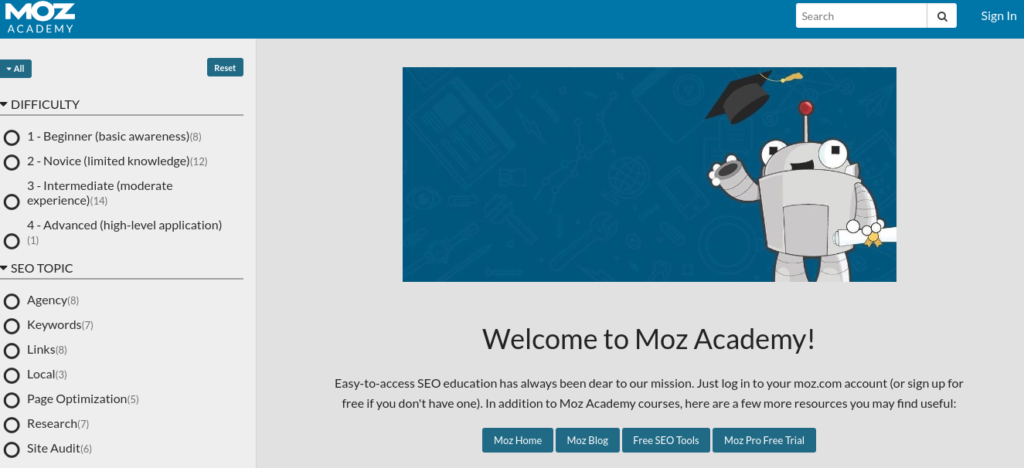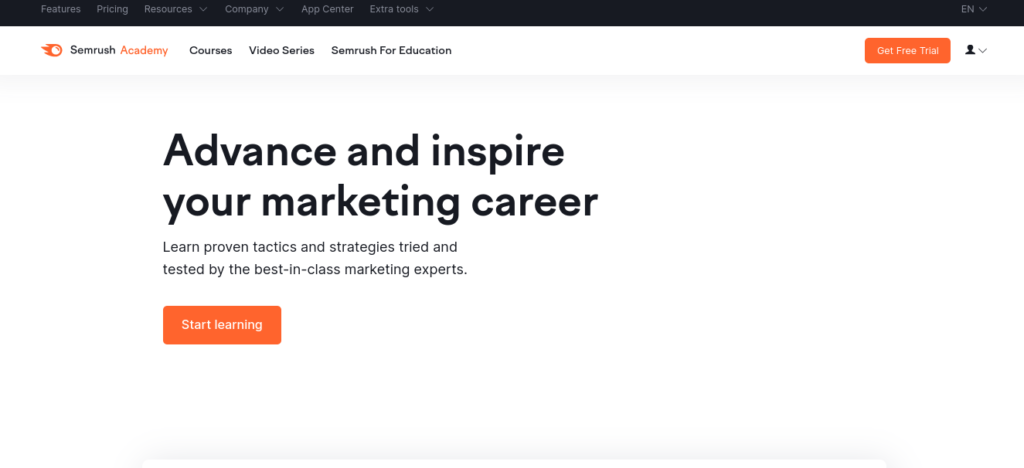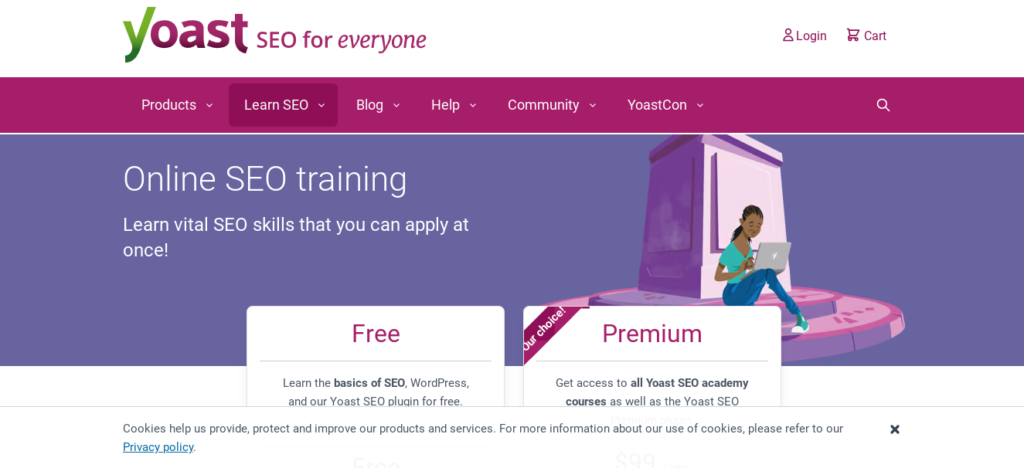E-commerce has become an integral part of our lives, with millions of people shopping online every day. With the increasing popularity of online shopping, it’s crucial for businesses to have a strong online presence to attract and retain customers. That’s where e-commerce marketing comes in – it’s the practice of promoting and selling products online.
Whether you’re a seasoned e-commerce marketer or just starting out, keeping up with the latest marketing strategies and techniques is essential to stay ahead of the competition. Fortunately, there are plenty of e-commerce marketing courses available that can help you learn the ins and outs of online marketing.
In this article, we’ll take a deep dive into the best e-commerce marketing courses available to help you improve your online marketing skills. From social media marketing to email marketing, SEO to PPC advertising, we’ll cover the top courses for each area of e-commerce marketing, as well as provide tips for choosing the right course for your needs. By the end of this article, you’ll have a solid understanding of the best e-commerce marketing courses available and be on your way to becoming a more effective online marketer.
Why Is E-Commerce Marketing Important?
E-commerce marketing is essential for the success of any online business. Here are some reasons why e-commerce marketing is important:
1. Increased visibility: E-commerce marketing helps businesses to reach a wider audience and increase their online visibility. With the right marketing strategies, businesses can reach potential customers who may not have otherwise found them.
2. Increased sales: Effective e-commerce marketing can lead to increased sales and revenue. By targeting the right audience with the right message, businesses can encourage more people to make purchases and increase their sales.
3. Improved customer engagement: E-commerce marketing can help businesses build relationships with their customers. By engaging with customers on social media or through email marketing, businesses can provide a more personalized experience and build brand loyalty.
4. Competitive advantage: In today’s digital world, businesses must have a strong online presence to remain competitive. E-commerce marketing can help businesses stand out from their competitors and position themselves as leaders in their industry.
5. Measurable results: E-commerce marketing provides businesses with measurable results. Through analytics and tracking tools, businesses can see how their marketing campaigns are performing and make data-driven decisions to improve their strategies.
Overall, e-commerce marketing is essential for any online business that wants to succeed in today’s digital landscape. It can help businesses reach a wider audience, increase sales, build customer relationships, gain a competitive advantage, and achieve measurable results.
What Are E-Commerce Courses?
E-commerce courses are educational programs designed to teach individuals and businesses how to succeed in the online retail industry. These courses typically cover a broad range of topics, from basic concepts such as setting up an online store and attracting customers, to more advanced strategies like optimizing conversions, running successful advertising campaigns, and scaling an e-commerce business.
The popularity of e-commerce has exploded in recent years, as more and more consumers turn to online shopping as a primary mode of purchasing goods and services. As a result, businesses that are not yet equipped to sell online are at risk of losing out to competitors that have a strong online presence. E-commerce courses offer a way for business owners and entrepreneurs to gain the skills and knowledge they need to succeed in this fast-growing industry.
There are many different types of e-commerce courses available, ranging from basic introductory courses to more advanced and specialized programs. Some courses focus on specific aspects of e-commerce, such as search engine optimization (SEO), pay-per-click (PPC) advertising, email marketing, or social media marketing. Other courses cover a wider range of topics, including website design, analytics, customer service, and logistics.
E-commerce courses can be delivered in a variety of formats, including online courses, in-person classes, and self-paced study programs. Online courses are particularly popular, as they offer the flexibility and convenience of learning from anywhere with an internet connection. Many e-commerce courses also offer certification programs, which can be a valuable credential for job seekers or businesses looking to showcase their expertise.
E-commerce courses are a valuable resource for anyone looking to succeed in the online retail industry. By gaining the skills and knowledge needed to navigate this rapidly changing landscape, businesses and entrepreneurs can position themselves for success in the digital age.
What To Look For In An E-commerce Marketing Courses
Here are some factors to consider when looking for an e-commerce marketing course:
1. Course Content: Look for a course that covers the specific e-commerce marketing topics that you’re interested in. It should cover various areas such as SEO, social media marketing, PPC advertising, email marketing, analytics, and more.
2. Instructor Experience: Ensure that the instructor has relevant e-commerce marketing experience and knowledge. You can check the instructor’s bio or LinkedIn profile to see if they have worked in the field, published articles, or have a relevant degree.
3. Course Format: Consider the course format that best fits your learning style. Do you prefer live classes or recorded video lectures? Do you prefer self-paced learning or scheduled classes? Choose a course format that works for you.
4. Course Duration: Make sure to check the course duration, and consider your availability before enrolling. If you have a full-time job or other commitments, you may need a course that you can complete at your own pace.
5. Course Reviews: Look for reviews of the course from previous students. Check for positive feedback on the instructor, course content, and overall value. You can also look for negative reviews to see if there are any common issues that you should be aware of.
6. Price: Finally, consider the price of the course and whether it fits your budget. Some courses may offer payment plans or discounts, so make sure to check for those as well.
By considering these factors, you can choose an e-commerce marketing course that fits your needs and helps you achieve your marketing goals.
Best E-commerce Marketing Courses For Beginners
Here are some of the best e-commerce marketing courses for beginners:
1. E-commerce Marketing Fundamentals by LinkedIn Learning: This course covers the basics of e-commerce marketing, including how to create a marketing plan, set up an e-commerce website, and drive traffic to it. It also covers social media and email marketing.
2. E-commerce Marketing 101 by Shopify: This course is specifically designed for beginners and covers the fundamentals of e-commerce marketing, including how to build a brand, create a website, and optimize it for search engines.
3. E-commerce Marketing Mastery by Udemy: This course covers the essential strategies and techniques for successful e-commerce marketing, including product research, market analysis, social media marketing, email marketing, and paid advertising.
4. Digital Marketing for E-commerce by Google: This course covers the basics of digital marketing for e-commerce businesses, including how to set up a website, use Google Analytics, and create effective online ads.
5. E-commerce Marketing for Beginners by HubSpot Academy: This course covers the basics of e-commerce marketing, including how to create a marketing plan, use social media, and optimize for search engines.
6. Social Media Marketing for E-commerce by Hootsuite Academy: This course covers the essentials of social media marketing for e-commerce businesses, including how to create a social media strategy, use social media advertising, and measure success.
7. Email Marketing for E-commerce by Mailchimp: This course covers the fundamentals of 7. email marketing for e-commerce businesses, including how to build an email list, create effective email campaigns, and measure success.
These courses are a great starting point for beginners in e-commerce marketing, and can help lay a solid foundation for further learning and growth.
Best E-Commerce Marketing Courses For SEO
Search engine optimization (SEO) is a vital aspect of e-commerce marketing as it helps businesses improve their visibility on search engines and attract more organic traffic. If you are looking to improve your SEO skills, there are many e-commerce marketing courses available online that can help you achieve your goals. Here are some of the best e-commerce marketing courses for SEO:
1. Moz Academy

Moz is a popular SEO software company that offers a range of courses on SEO and related topics. Their courses cover everything from the basics of SEO to advanced techniques like keyword research, link building, and site architecture. The courses are available in video format and include quizzes and assignments to test your knowledge.
2. SEMrush Academy

SEMrush is another popular SEO software company that offers a range of courses on SEO and related topics. Their courses cover everything from the basics of SEO to advanced techniques like keyword research, link building, and site architecture. The courses are available in video format and include quizzes and assignments to test your knowledge.
3. Yoast SEO Training

Yoast is a popular SEO plugin for WordPress, and they offer a range of courses on SEO and related topics. Their courses cover everything from the basics of SEO to advanced techniques like keyword research, link building, and site architecture. The courses are available in video format and include quizzes and assignments to test your knowledge.
4. HubSpot Academy

HubSpot offers a range of courses on marketing, including SEO. Their SEO course covers everything from the basics of SEO to advanced techniques like keyword research, link building, and site architecture. The course is available in video format and includes quizzes and assignments to test your knowledge.
5. Google Analytics Academy

While not strictly an SEO course, understanding how to use Google Analytics is essential for measuring the success of your SEO efforts. Google Analytics Academy offers a range of courses on how to use Google Analytics to track website traffic, monitor user behavior, and measure the success of your marketing campaigns.
When choosing an e-commerce marketing course for SEO, it is essential to consider your level of expertise and the specific areas of SEO you want to improve. Some courses may be more suited to beginners, while others may be more suited to advanced marketers. Additionally, it’s essential to consider the format of the course, whether it’s in video format, text format, or a combination of both, and the level of support and interaction provided. By choosing the right e-commerce marketing course for SEO, you can improve your skills, attract more organic traffic, and grow your business.
How To Choose The Right E-commerce Marketing Course For You
Choosing the right e-commerce marketing course can be a daunting task, especially with the plethora of options available online. However, with some guidance, you can select a course that will provide you with the necessary skills to excel in e-commerce marketing. Here are some tips to help you choose the right e-commerce marketing course for you:
1. Define Your Goals: Before choosing an e-commerce marketing course, you should define your goals. Determine what skills you want to acquire or improve, and what specific areas of e-commerce marketing you want to focus on. This will help you select a course that meets your specific needs.
2. Look for Relevant Content: When selecting an e-commerce marketing course, it is essential to look for one that offers relevant and up-to-date content. Ensure that the course covers topics that are essential for e-commerce marketing success, such as social media marketing, SEO, PPC advertising, email marketing, and content marketing.
3. Check the Instructor’s Credentials: Before signing up for a course, it’s important to check the instructor’s credentials. The instructor should have significant experience and expertise in e-commerce marketing and be able to provide real-life examples and case studies to help you understand the concepts better.
4. Read Reviews and Testimonials: Reading reviews and testimonials from previous students can provide you with insights into the course’s quality and effectiveness. Look for courses that have a high rating and positive reviews from students who have taken the course.
5. Check Course Delivery: The course delivery format is also crucial when selecting an e-commerce marketing course. Determine if the course is online or in-person, and if the format fits your learning style. Ensure that the course’s delivery is engaging and interactive, with practical exercises and hands-on learning opportunities.
6. Consider Price and Value: E-commerce marketing courses vary in price, so it’s essential to consider your budget. However, it’s equally important to consider the value the course offers. Look for courses that provide value for money by offering a broad range of topics, practical exercises, and access to additional resources such as webinars and e-books.
7. Look for Certification: Finally, consider if the course offers a certification upon completion. A certification can add credibility to your e-commerce marketing skills and boost your resume.
FAQS
1. What is an e-commerce marketing course?
An e-commerce marketing course is a program designed to teach people how to effectively promote and sell products online. It covers a range of topics including SEO, PPC advertising, email marketing, social media marketing, and analytics.
2. Why should I take an e-commerce marketing course?
An e-commerce marketing course can help you acquire the necessary skills and knowledge to create successful online marketing campaigns. It can also help you stay up to date with the latest trends and strategies in the industry.
3. What should I look for in an e-commerce marketing course?
When choosing an e-commerce marketing course, look for one that covers the topics you are interested in and provides hands-on experience. You should also consider the reputation of the instructor, the quality of the course content, and the level of support provided.
4. How long does an e-commerce marketing course take?
The duration of an e-commerce marketing course can vary depending on the program you choose. Some courses may take only a few hours, while others may last several months.
5. How much does an e-commerce marketing course cost?
The cost of an e-commerce marketing course can vary widely, from free online courses to expensive in-person programs. You should choose a course that fits your budget and provides value for money.
6. Are e-commerce marketing courses worth it?
Yes, e-commerce marketing courses can be worth the investment if they provide you with valuable skills and knowledge that can help you succeed in the industry.
7. Can I take an e-commerce marketing course online?
Yes, many e-commerce marketing courses are available online, which makes them accessible to people all over the world. Online courses also provide flexibility in terms of schedule and location.
8. Will an e-commerce marketing course guarantee my success?
No, an e-commerce marketing course cannot guarantee your success, but it can provide you with the necessary skills and knowledge to increase your chances of success. Success ultimately depends on your ability to apply what you have learned and adapt to the constantly evolving e-commerce industry.
Conclusion
There are many great e-commerce marketing courses available to help businesses of all sizes increase their online sales and reach their target audience more effectively. Whether you’re just starting out or looking to take your marketing skills to the next level, there are courses that can meet your needs.
To choose the best e-commerce marketing course, it’s important to consider your level of expertise, your specific business goals, and the type of marketing channels you want to focus on. Look for courses that offer practical, actionable insights, and are taught by experienced professionals with a track record of success.
Remember, investing in e-commerce marketing education can be a valuable long-term strategy for growing your business and staying competitive in the online marketplace. So, take the time to research your options and find the right course that can help you achieve your marketing goals.





 Get Sala Now
Get Sala Now